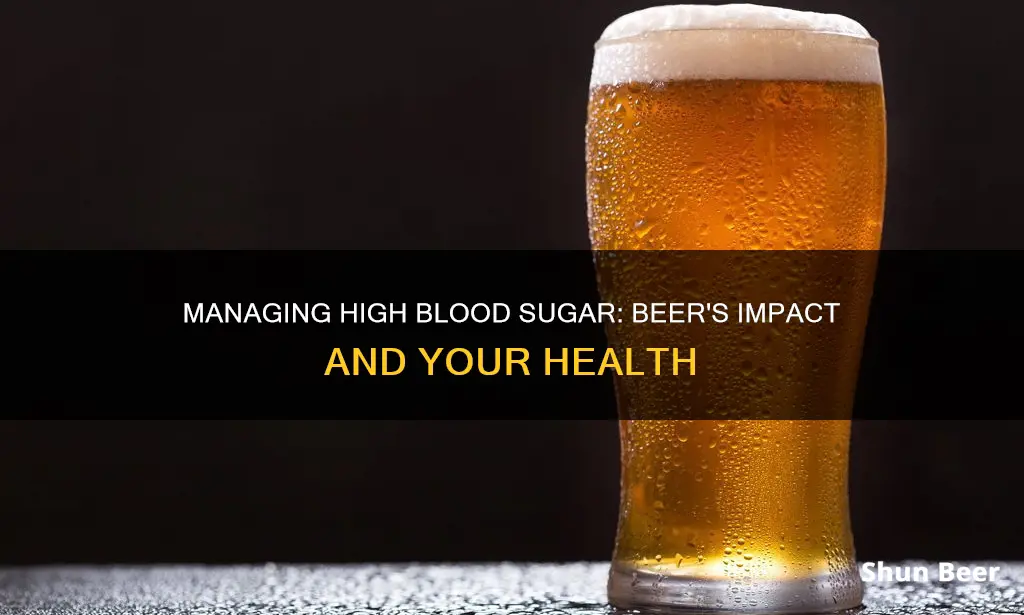
Drinking alcohol can be a tricky business for people with high blood sugar or diabetes. Alcohol can affect blood sugar levels, and the liver's ability to regulate blood sugar. Beer, being relatively high in carbohydrates, can cause blood sugar levels to rise. However, excessive alcohol consumption can also lead to low blood sugar, which can be dangerous. For people with diabetes, drinking alcohol may cause blood sugar to either rise or fall, and it can interfere with diabetes medication. So, can you drink beer if you have high blood sugar? The answer is yes, but in moderation, and it's important to be aware of the risks and take precautions.
What You'll Learn

Beer and other alcoholic drinks can increase blood sugar levels
Beer and other alcoholic drinks can have both positive and negative effects on blood sugar levels. While moderate drinking may improve blood glucose management and insulin sensitivity, excessive alcohol consumption can lead to higher blood sugar levels.
The impact of alcohol on blood sugar levels
Alcohol can interfere with blood sugar levels and the hormones needed to maintain healthy blood sugar levels. When you drink alcohol, your liver needs to break it down. While your liver is processing alcohol, it stops releasing glucose, which can cause your blood sugar level to drop quickly. This puts you at risk of hypoglycemia, especially if you take insulin or certain diabetes medications.
The role of the liver
The liver stabilizes glucose levels by storing carbohydrates and releasing them into the bloodstream. However, when you drink alcohol, your liver prioritizes metabolizing the alcohol over maintaining your blood glucose levels, which can lead to hypoglycemia. This is more likely to occur when you drink on an empty stomach, as your liver has to work harder to break down the alcohol.
Calories and carbohydrates in alcoholic drinks
Alcoholic drinks, especially beer and sweetened mixed drinks, are high in carbohydrates, which can raise blood sugar levels. Additionally, calories from alcohol are stored in the liver as fat, making it more difficult to manage diabetes. Over time, this can lead to insulin resistance and higher blood sugar levels.
Recommendations for people with diabetes
If you have diabetes, it is important to understand the risks associated with alcohol consumption. While you do not need to cut alcohol out of your diet completely, it is recommended to drink in moderation and only when your diabetes and blood sugar levels are well-controlled. Here are some additional guidelines for people with diabetes:
- Do not drink more than one drink per day if you are a woman or two drinks per day if you are a man.
- Drink alcohol only with food, especially carbohydrates, to help maintain normal blood sugar levels.
- Avoid sugary mixed drinks, sweet wines, or cordials, as they can increase blood sugar levels.
- Drink slowly and stay hydrated with water or diet soda.
- Check your blood sugar levels regularly, especially before and after drinking.
- Consult with your doctor to understand how alcohol may affect you and ensure it is safe for you to drink.
Drinking Beer and Riding a Bike: Is It Safe?
You may want to see also

Alcohol interferes with blood sugar regulation
The liver plays a crucial role in stabilising glucose levels by storing carbohydrates and releasing them into the bloodstream as needed. However, when you consume alcohol, your liver prioritises metabolising it over maintaining your blood glucose levels, which can lead to hypoglycemia. This is especially true when you drink on an empty stomach.
Additionally, alcohol can cause inflammation of the pancreas, disrupting insulin production. Research has shown that excessive alcohol consumption can lead to pancreatitis, resulting in damage and dysfunction of the organ.
Furthermore, alcohol can also increase insulin resistance. Calories from alcohol are stored in the liver as fat, and liver fat makes liver cells more insulin resistant, which can lead to higher blood sugar levels over time.
The effects of alcohol on blood sugar regulation can last for hours after your last drink, and the more drinks you have, the higher the risk. Therefore, it is crucial to monitor your blood glucose levels and drink in moderation.
Paxlovid and Beer: Is It Safe to Mix?
You may want to see also

Alcohol can affect diabetes medications
Secondly, alcohol can interact with diabetes medications, increasing their blood-sugar-lowering effects and leading to a potentially dangerous drop in blood sugar levels. This is particularly true for medications like insulin and sulfonylureas, which also stimulate the pancreas to produce more insulin. The combination of these effects can result in hypoglycaemia or even "insulin shock", a medical emergency.
Thirdly, alcohol can affect the hormones that regulate blood sugar levels. It diverts metabolic pathways, disrupting glucose production in the liver and contributing to low blood sugar. Additionally, alcohol can decrease insulin sensitivity, impacting the body's ability to regulate blood sugar effectively.
Finally, alcohol may interfere with hypoglycaemic medications, making them less effective. This interference can put individuals at risk for low or high blood sugar (hyperglycaemia), depending on how much alcohol is consumed and the type of medication taken.
It is important to note that the risks associated with drinking alcohol while taking diabetes medications can be mitigated by consulting a healthcare provider. They can advise on the safe consumption of alcohol and recommend specific medications that may be better suited for individuals who choose to drink.
Hopsy Beer: How Does the Freshness Work?
You may want to see also

Alcohol stimulates the appetite, which can cause you to overeat
Drinking alcohol can affect your blood sugar levels, whether you have diabetes or not. Beer, for example, contains carbohydrates that get absorbed into the bloodstream relatively quickly, leading to increased glucose levels. Alcohol also interferes with blood sugar regulation by disrupting the hormones that control it.
There is good evidence that alcohol increases hunger, but only once you start eating. In studies where participants were asked to rate their hunger throughout an experiment, researchers found increased hunger ratings once subjects had begun eating after drinking alcohol. It also seems that alcohol can reduce how satiated or full we feel after eating. A 2001 study found that alcohol inhibits the secretion of leptin, a hormone that inhibits hunger and makes us feel full. On the other hand, a 2005 study found that alcohol decreased the amount of ghrelin, a hormone that increases food intake, in the blood.
Because alcohol is so woven into our cultural traditions and daily lives, studies on how drinking affects hunger can be influenced by expectation effects. We've come to associate drinking with eating, especially less healthy foods. This belief is so strong that in one study, participants who consumed alcohol-free beer (that they weren't told was alcohol-free) or juice increased their caloric intake more after the beer. However, expectation effects alone do not explain alcohol's effects on appetite. In the same study, when participants were given alcohol without being told, their caloric intake increased the most when they didn't expect to be consuming alcohol.
Beer and Zarelto: Safe or Not?
You may want to see also

Alcohol can cause weight gain
Alcoholic drinks such as beer and sweetened mixed drinks are high in carbohydrates, which can raise blood sugar levels. Alcohol also has a lot of calories, which can lead to weight gain and make it harder to manage diabetes. Calories from alcohol are stored in the liver as fat, and liver fat makes liver cells more insulin resistant, which can make your blood sugars higher over time.
The number of calories in alcoholic drinks varies. A regular beer contains about 150 calories in a 12-ounce (355 mL) glass, while a light beer contains about 100 calories. Higher alcohol or craft beers contain 170 to 350 calories in a 12-ounce glass. A distilled spirit like gin, rum, vodka, or whiskey contains about 100 calories in a 1.5-ounce (45 mL) serving. A martini (extra dry) contains about 140 calories in a 2.25-ounce (65 mL) glass, while a piña colada contains about 380 calories in a 7-ounce (207 mL) glass.
The Foundation for Alcohol Research and Education (FARE) conducted a systematic review on alcohol and obesity and found that it is unclear whether alcohol consumption is a risk factor for weight gain. Where there is a positive association between alcohol and body weight, it is more likely to be found in men than in women. The present data does not provide sufficient scientific evidence to determine whether beer intake is associated with general or abdominal obesity. However, when there is a positive association, it is more likely to be for abdominal obesity (abdominal fat around the stomach) than for general obesity for both men and women.
Silverwood Lake's Beer Rules Explained
You may want to see also
Frequently asked questions
Drinking beer is generally not recommended for people with high blood sugar or diabetes, as alcohol interferes with blood sugar regulation and can lead to dangerously low blood sugar levels (hypoglycemia). However, moderate drinking (no more than one to two drinks per day) may be acceptable for most people with well-controlled blood sugar.
Beer contains carbohydrates that are quickly absorbed into the bloodstream, leading to increased glucose levels. Drinking excessive amounts of beer can also reduce blood sugar levels, which can be dangerous and lead to symptoms like fatigue, sweating, and confusion.
Drinking beer with high blood sugar can affect diabetes medications, increase the risk of complications, interfere with blood sugar regulation, and contribute to weight gain due to the calories in beer. Additionally, the symptoms of low blood sugar can be similar to those of alcohol intoxication, making it challenging to distinguish between the two.
Yes, "light" or low-carb beers typically have fewer carbs and a lower alcohol content, making them a better option for people with high blood sugar. However, it is important to remember that even these options should be consumed in moderation and accompanied by food.
If you decide to drink beer, it is important to do so in moderation and only when your blood sugar is well-controlled. Drink slowly, and always accompany alcohol with food to help maintain normal blood sugar levels. Avoid drinking on an empty stomach, and monitor your blood sugar levels regularly before and after drinking.







